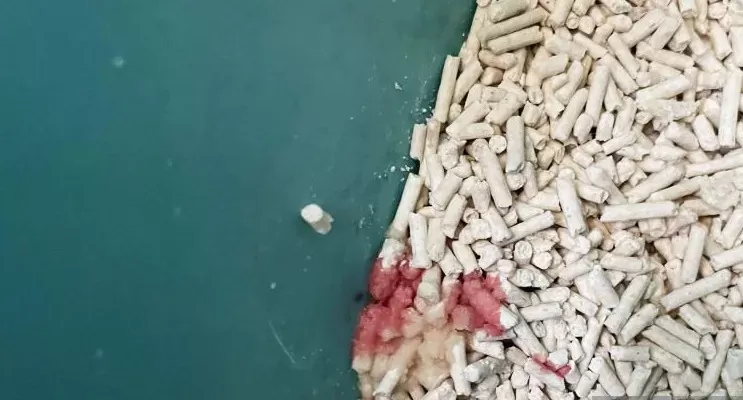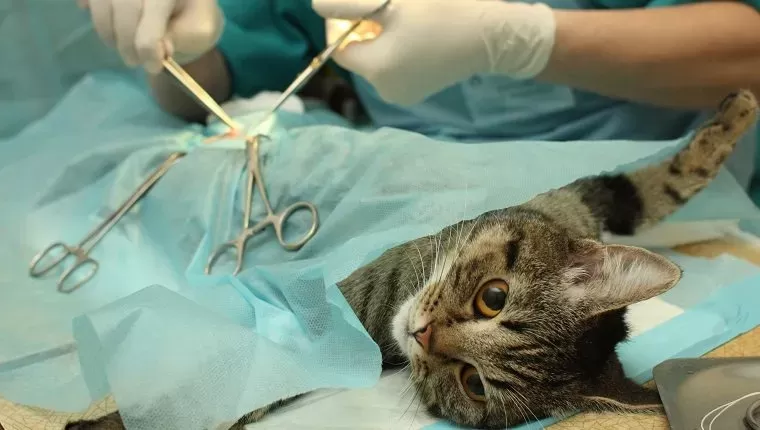Blood In Cat Urine: Causes, Symptoms, and What to Do
Discovering blood in your cat's urine can be a distressing experience for any pet owner. It's a clear indication that something is amiss with your furry friend's health. While it's natural to worry, it's essential to stay calm and informed. In this article, we'll explore the potential causes of blood in cat urine, the associated symptoms, and what you can do to help your beloved feline companion.
How to Tell If There is Blood in Cat Urine?
One of the most obvious signs of blood in cat urine is a change in color. Normally, cat urine should be a pale yellow to amber color. If you notice that the urine is pink, red, brown, or orange, it may contain blood. Blood in urine may be more apparent in the clumps of urine-soaked litter.
If your cat is straining to urinate or appears to be in pain while urinating, it could be a sign of blood in the urine or another urinary issue.
Blood in cat urine may have a distinct odor. If you notice a foul or unusual smell coming from the litter box or your cat's urine, it could indicate a problem.

What Causes Blood in Cat Urine?
Blood in a cat's urine, known as hematuria, can be caused by various factors, and it can originate from different parts of the urinary tract. The potential causes of blood in cat urine can be categorized into three main areas:
Upper Urinary Tract Causes
-
Kidney Disease: Conditions such as kidney infections, kidney stones, or glomerulonephritis (inflammation of the kidney's filtering units) can lead to blood in the urine.
-
Ureteral Stones: Stones that form in the ureters can cause irritation and bleeding when they move.
-
Trauma: Severe injury to the kidneys or ureters can result in blood in the urine.
Lower Urinary Tract Causes
-
Urinary Tract Infections (UTIs): Bacterial infections of the bladder or urethra can cause inflammation and bleeding.
-
Bladder Stones or Crystals: These can irritate the bladder lining and cause blood in the urine.
-
Bladder Infections or Cystitis: Inflammation of the bladder can lead to bleeding.
-
Feline Lower Urinary Tract Disease (FLUTD): FLUTD is a common syndrome in cats that includes various conditions, such as idiopathic cystitis and urinary tract obstructions, which can result in hematuria.
-
Trauma: Injury to the bladder or urethra, such as from a fall or accident, can cause bleeding.
-
Cancer: Tumors in the bladder or urethra can lead to blood in the urine.
Other Possible Causes
-
Coagulopathies: Disorders that affect blood clotting can lead to spontaneous bleeding in the urinary tract.
-
Medications: Certain medications, especially anticoagulants, can cause blood in the urine.
-
Systemic Diseases: Conditions like hypertension (high blood pressure) or systemic infections can affect the urinary tract and result in hematuria.
Can Stress Cause Blood in Cat Urine?
Yes, stress can lead to conditions like feline lower urinary tract disease (FLUTD), which encompasses various urinary problems, including inflammation of the bladder (cystitis) or the formation of crystals or stones in the urinary tract. These conditions can cause blood in the urine and are often exacerbated by stress.
Can Worms Cause Blood in Cat's Urine?
Worms themselves typically do not directly cause blood in a cat's urine (hematuria). However, if a cat has a severe hookworm infestation, it can lead to anemia (a decrease in red blood cell count), which might cause blood to appear in the urine. Additionally, some parasites can migrate and cause damage to the urinary tract or other organs, potentially leading to hematuria.
Can Blood in Cat Urine Go Away on Its Own?
Minor hematuria may go away on its own, but severe infections may require antibiotic treatment, and some are even caused by tumors, which can be fatal if left untreated.
Is Blood in Cat Urine An Emergency?
While the presence of blood in a cat's urine doesn't always constitute an immediate emergency, it should be addressed promptly by a veterinarian. Identifying and addressing the issue early can prevent it from worsening or causing additional complications.
Treating Blood in Your Cat’s Urine
Your veterinarian will diagnose your cat before treatment and may recommend additional tests like blood work, urine analysis, and imaging (such as X-rays or ultrasound) to determine the cause of the blood in the urine.
Once the cause of the blood in your cat's urine is identified, your vet will recommend an appropriate treatment plan. This may include medication, dietary changes, surgery, or other interventions depending on the underlying condition.
Collect a Urine Sample: If possible, collect a fresh urine sample before your vet visit. This can help diagnose the underlying issue more accurately.
Treatment for feline hematuria is based on the underlying cause. Some common treatments for blood in the urine, cystitis, Kidney Disease, Trauma Bladder Stones or Crystals, Urinary Tract Infections, Cancer and FLUTD are:
Cystitis (Feline Lower Urinary Tract Disease - FLUTD):
Increase water intake: Encouraging your cat to drink more water can help dilute urine and reduce irritation.
Prescription diets: Special diets designed to promote urinary health can be recommended by your veterinarian.
Pain management: Pain medications may be prescribed to alleviate discomfort.
Kidney Disease:
Dietary management: Specialized renal diets with reduced protein and phosphorus content may be recommended.
Fluid therapy: Subcutaneous or intravenous fluids can help manage hydration and electrolyte balance.
Medications: Medications to control hypertension and manage kidney disease symptoms may be prescribed.
Trauma:
Surgical intervention: In cases of severe trauma or injury, surgical procedures may be necessary to repair damaged tissues.
Pain management: Pain relief medications may be prescribed to manage discomfort.
Bladder Stones or Crystals (Urolithiasis):
Dietary changes: Prescription diets can be used to dissolve certain types of stones or prevent their formation.
Surgery: In some cases, surgical removal of stones may be necessary.
Medications: Medications can help manage pain and inflammation.
Urinary Tract Infections (UTIs):
Antibiotics: Specific antibiotics are prescribed to treat bacterial infections.
Hydration: Ensuring your cat drinks plenty of water can help flush out bacteria.
 |
Treatment for
|
Cancer:
Treatment varies depending on the type and stage of cancer and may include surgery, radiation therapy, chemotherapy, or a combination of these treatments.
Palliative care: In advanced cases, the focus may shift to providing comfort and pain relief.
FLUTD (Feline Lower Urinary Tract Disease):
Treatment depends on the specific cause within the FLUTD spectrum, which can include cystitis, crystals, or urinary tract obstructions.
It may involve dietary changes, medications, and addressing underlying stress factors.
How to Collect A Urine Sample From A Cat?
-
Use a clean, disposable litter box or tray.
-
Replace the regular litter with non-absorbent cat litter crystals or small plastic pellets.
-
Wait for your cat to urinate in the special litter.
-
Using a clean, sterile container, collect the urine as soon as possible after urination.
-
Seal the container tightly and refrigerate it if you can't take it to the vet immediately.
Make sure to follow your vet's specific instructions for collecting and storing the urine sample, as they may have additional guidelines.
Preventing Common Urinary Problems in Cats
Preventing common urinary problems in cats is crucial for their overall health and well-being. Here are some strategies to help prevent these issues:
Proper Hydration
Ensure your cat has access to fresh, clean water at all times. Some cats prefer running water, so consider a cat water fountain.
Wet cat food can contribute to their overall fluid intake, as it contains more moisture than dry kibble.
Maintain a Clean Litter Box
Keep the litter box clean and scooped daily. Cats may avoid a dirty box, which can lead to urinary issues.
Provide an appropriate number of litter boxes for multiple cats in your household.
Promote Urination
Encourage urination by providing multiple litter boxes in different locations.
Some cats prefer larger, uncovered boxes, while others prefer covered ones. Experiment to see what your cat prefers.
Spaying/Neutering
Spaying/neutering can reduce the risk of certain urinary tract issues in cats, especially in males.

Related: What Does A Neutered Cat Look Like
When Can I Get My Cat Spayed After Having Kittens
Conclusion
Finding blood in your cat's urine can be alarming, but it's essential to remember that many underlying causes are treatable when detected early. Regular veterinary check-ups maintaining good hydration and a balanced diet can help prevent urinary issues in your feline companion. Always consult your veterinarian for proper diagnosis and treatment to ensure your cat enjoys a healthy and comfortable life. Your cat's well-being is worth the extra attention and care.
You May Also Like
View all
Puainta® Eye Drops for Dog Allergies and Cats Conjunctivitis

Puainta® Dog/ Cats Ear Cleaner Solution

Puainta® Ointment for Ear Mites & Otitis

Puainta®Fenbendazole Tablets Dewormer
Join The Puainta
Become one of pet parents and get professional tips, immediate product info, updated promotions and discounts, and more surprises from us!





















This site is protected by reCAPTCHA and the Google Privacy Policy and Terms of Service apply.